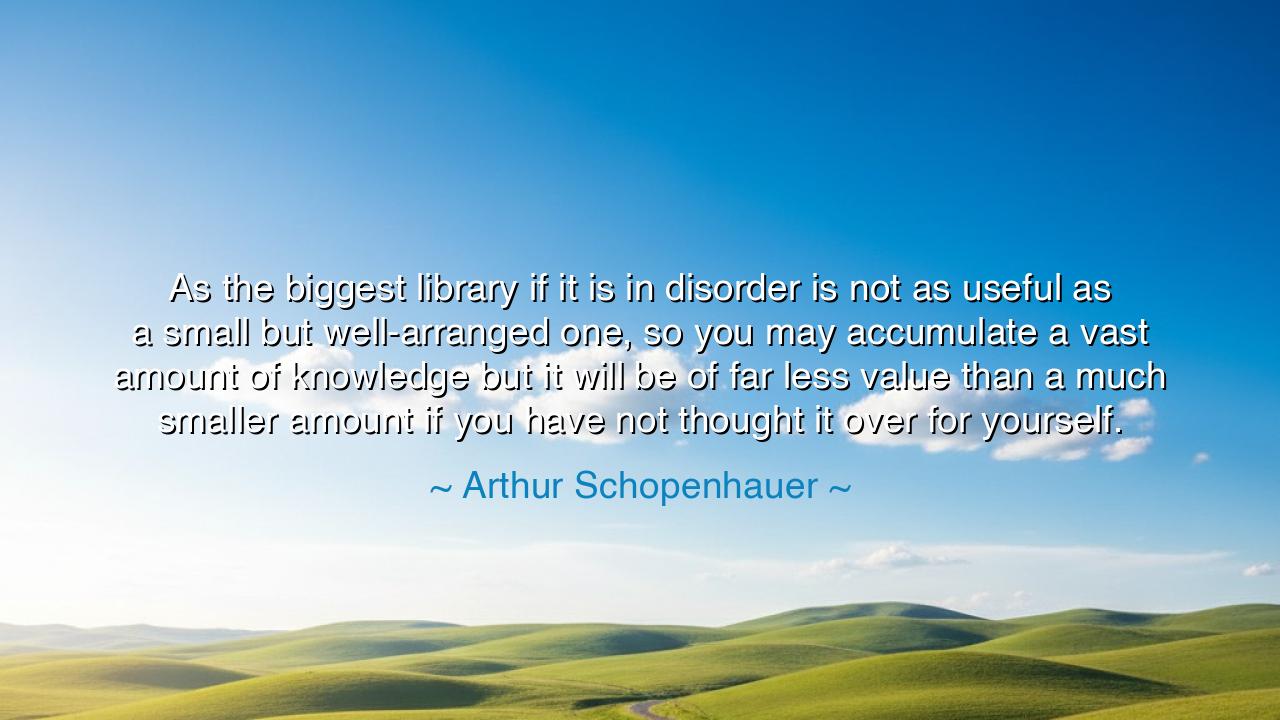
As the biggest library if it is in disorder is not as useful as a
As the biggest library if it is in disorder is not as useful as a small but well-arranged one, so you may accumulate a vast amount of knowledge but it will be of far less value than a much smaller amount if you have not thought it over for yourself.






Hear the penetrating words of Arthur Schopenhauer, philosopher of depth and sharpness: “As the biggest library, if it is in disorder, is not as useful as a small but well-arranged one, so you may accumulate a vast amount of knowledge but it will be of far less value than a much smaller amount if you have not thought it over for yourself.” In this image, he shows us that wisdom is not measured by abundance, but by clarity and order. A room filled with scrolls scattered in confusion cannot enlighten its keeper, while a few well-placed works, carefully studied, may open the doors of truth. So too with the mind: it is not the vastness of what you know, but the order and reflection you bring to it, that makes knowledge shine.
The ancients spoke often of this truth. Socrates warned against being a collector of opinions without testing them, like a miser hoarding coins he never spends. Seneca wrote that it is better to read a few books with depth than many with haste, for true wisdom comes from digestion, not mere swallowing. Schopenhauer, walking in this same path, warns us against the pride of accumulation—of piling up facts and quotes without making them our own. For only what is thought over, wrestled with, and digested becomes true knowledge within us.
Consider the story of Alexander’s library in Alexandria. It was said to contain hundreds of thousands of scrolls, the greatest collection of its time. Yet when fire consumed it, much was lost without ever having been read or understood. What good was such abundance, if much of it lay untouched, without reflection or use? Contrast this with Epictetus, the slave who owned no library but pondered deeply the lessons of life. With little, he became one of the greatest teachers of philosophy. Here we see Schopenhauer’s truth: a few well-arranged insights outweigh mountains of unread words.
This lesson is not only for philosophers and kings, but for every life. A student may memorize countless facts, yet if he never reflects, never connects them, never applies them, he remains ignorant in practice. Another, with fewer facts but with deep understanding, may outshine him in wisdom and effectiveness. So too in every craft: the carpenter who masters a few tools well builds better than the one who owns many but knows none. The worth of knowledge lies not in its size, but in its living order within the mind.
Schopenhauer’s words also caution us against the vanity of appearing learned. Many speak endlessly, quoting books and authorities, but their minds are like disordered libraries, where nothing can be found when needed. They dazzle with noise, but falter when truth is required. Better is the quiet soul who has reflected upon a few truths, arranged them in his heart, and made them living guides. Such a one may speak little, but his words are weighty, his actions steady, his knowledge luminous.
The lesson, then, is plain: do not strive merely to accumulate, but to assimilate. Read less, but think more. Learn widely, but pause often to reflect. Take each truth and set it in order in your soul, so that when the hour of need comes, you may reach for it swiftly, as one finds a book in a well-arranged library. For it is not possession but mastery that grants wisdom, not numbers but clarity that makes knowledge powerful.
What then must you do? Approach learning as a craftsman approaches his tools. Keep them sharp, keep them ordered, and use them often. Do not drown yourself in seas of information without building islands of understanding. Choose a few truths each day to ponder, turn them over in thought, and make them your own. In this way, your mind will become a library not vast but luminous, where every shelf has meaning and every book has life.
Thus remember Schopenhauer’s words: “As the biggest library if it is in disorder is not as useful as a small but well-arranged one…” Let them remind you that greatness lies not in accumulation, but in reflection, order, and wisdom. For the true sage is not the one who knows the most, but the one who knows rightly, and lives by what he knows.






AAdministratorAdministrator
Welcome, honored guests. Please leave a comment, we will respond soon